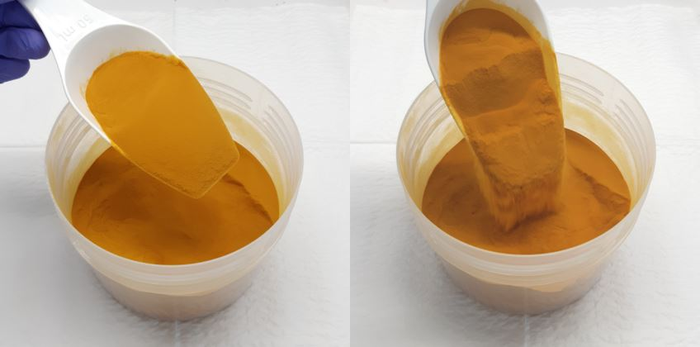Mercury pollution is considered a global issue in air, water, and soil near goldmines, cement, and few metal production, and other huge industries burning fossil fuels, with removal that is so costly or challenging in a few of the poorest countries in the world.
 Poly(S-r-limonene)-coated silica is a free flowing orange powder and fast acting mercury sorbent. 300 grams produced in a single batch pictured. Image Credit: Flinders University
Poly(S-r-limonene)-coated silica is a free flowing orange powder and fast acting mercury sorbent. 300 grams produced in a single batch pictured. Image Credit: Flinders University
At present, experts from Flinders University have extended testing of a considerable extraction material that can absorb nearly all mercury present in polluted water within minutes—itself made entirely from affordable waste from the citrus, petroleum, and agricultural production.
The tests displayed nearly complete absorption of mercury within minutes in trial conditions, according to a senior author Professor Justin Chalker and fellow scientists in a new journal article published by the Royal Society of Chemistry.
It is clear from the study that this mercury-binding material, invented at Flinders University, is ultra-fast in its ability to remove mercury from water. In some cases, more than 99% of the mercury is captured in just a few minutes.
Justin Chalker, Study Senior Author and Professor, Flinders University
Chalker Laboratory co-author Dr Max Worthington states testing was carried out on a new material made by coating silica with sulfur and limonene. It is a novel chemical combination that has already proven effective in absorbing waste mercury.
This silica covered with an ultra-thin coating of poly(S-r-limonene), using sulfur left over in petroleum production and orange oil from orange peel discarded by the citrus industry, was extensively tested in various pH and salt concentrations.
Justin Chalker, Study Senior Author and Professor, Flinders University
Chalker added, “Not only is this new mercury sorbent able to rapidly bind to mercury in water, but is also selective in taking up mercury but not other metal contaminants such as iron, copper, cadmium, lead, zinc and aluminium.”
This implies that only mercury can bind to the orange-sulfur sorbent, which aids safety following the capture of the inorganic mercury, adds co-author Dr Max Mann from the Flinders University Chalker Lab.
The particles contained in just 27g of this free-flowing orange powder has an approximate surface area of a soccer field, and it can be quickly produced in large enough volumes to suit contamination levels.
Justin Chalker, Study Senior Author and Professor, Flinders University
Chalker Lab PhD candidate Alfrets Tikoalu states silica sourced from agricultural waste, such as rice or wheat production, could also be utilized to make the material even more long-lasting.
Chalker added, “This mercury remediation technology can be a circular economy solution for a more sustainable world because this value-added material is made entirely from waste.”
Mathematical modeling was utilized to qualitatively comprehend the rate of mercury uptake. This is data that is crucial to quantifying and improving the new sorbent in real-world remediation.
“This is an exciting new development in producing renewable and accessible solutions to major environmental issues facing the world today,” stated applied mathematician Dr Tony Miller, another co-author on the publication in Physical Chemistry Chemistry Physics.
The project is an “excellent example of collaboration across chemical and physical sciences and mathematics to understand the rate of mercury uptake by our new and innovative sorbent,” added Professor Chalker.
Journal Reference:
Worthington, M. H. J., et al. (2022) Modelling mercury sorption of a polysulfide coating made from sulfur and limonene. Physical Chemistry Chemical Physics. doi.org/10.1039/D2CP01903E.